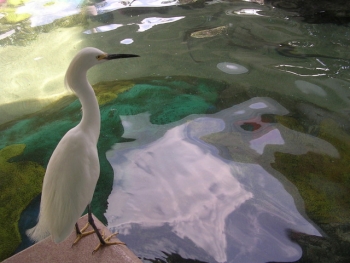The words came quietly through a text on my cell phone. After almost eight years, there was good news.
My husband and I bought our house several years ago without realizing what was at stake regarding the property. At the time of purchase, all we knew is that we had a brick home on a large piece of land, our privacy guaranteed on a road with no outlet--a lovely tidal creek at the end of our street. It was our place in the sun, the beach just minutes away.
We soon learned, though, that there was heated and controversial debate in our city regarding a massive road project to extend an already existing parkway. And that extention would go right through our street, the tidal creek destroyed. Our hearts grieved not only for the possibility of losing our privacy and home value, but also for the potential destruction of the distinct and lush geography that typifies the Lowcountry of South Carolina, and the habitat for so many tidal creatures that live and feed at the creek.
Giovanni and I became active with a group fighting the project. We attended strategy sessions for the group and countless city council meetings in order to lend a voice against the project. We wrote letters to the editor. It appeared at almost every turn, however, that we fought a losing battle. The city council approved the project. There was one problem. A big one. When the idea for the road was birthed, over 400 million dollars of the Infrastructure Bank of South Carolina was set aside for completion. Now after so many years of postponements and delays, the project would now cost over 700 million dollars. The city council wanted to move forward witih a penny sales tax to cover the extra millions. But that ten-word text after all these years and controversy settled things. I read: "The South Carolina Infrastructure Bank voted to kill the project."
Over the years, I'd certainly done my part by attending meetings and writing letters to the editor. But there was more to the victory. The tidal creek at the end of our road was a haven for me. Almost daily I walked down to its waters. An ancient oak, its branches decked out in Spanish moss, stood sentinel at the creek's edge. I grew accustomed to seeing pelicans dive for fish, seagulls fly overhead, and every now and then I'd witness a couple of dolphins gliding down the brackish waters and hear the elegant sound of their whooshing breath. But the sight I loved most were the egrets. They often hid in the tidal grasses, and I'd only glimpse a flash of the arctic whiteness of their feathers. Sometimes, though, if I was very quiet, I'd come upon one feeding in the creek waters at lowtide--their bright whiteness contrasted against the green-gray creek waters a mesmerizing experience. Each time I came to the tidal creek, I couldn't imagine this nature sanctuary not being available to these lovely creatures and to me. And so I would pray, "God confound the plans of this city. Prevent the road project." It seemed such an outlandish prayer, but perhaps that single stone in the slingshot to fell a pompous giant.
The day I read the ten-word text, I walked down to the tidal creek. I could see no birds, the waters still and perfectly reflecting the light blue sky. I thanked God for all the layers of protection that he had bestowed upon our community over the long fight. And then, just as I was about to turn and leave, I spotted an egret, its white wingspan unmistakable, taking flight just to my left. I watched the bird fly out over the horizon, mindful of God's tender power. He who cares for the birds of the air and hears the prayer of an ordinary woman.

